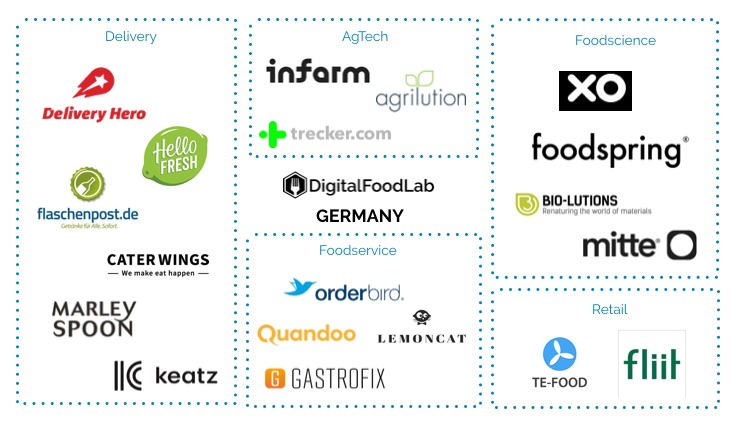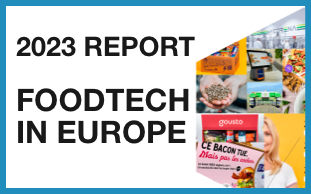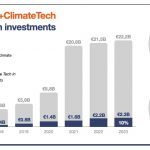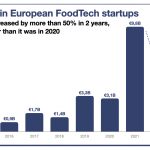Hi,
I have to admit that I had a tendency to sum up Germany’s FoodTech to Delivery Hero, Hello Fresh and sometimes I added Marley Spoon. Three startups that have been met with success mostly outside of Germany (in Asia and South America for Delivery Hero, in the US for Hello Fresh and in Australia for Marley Spoon). Hence, I was quite sceptical about Germany’s ecosystem. However, I was wondering how such world leaders can have been built there and if Germans had a magic equation to build FoodTech Unicorns that could be replicated in other European countries. Which logically, at least if you have followed us for some time, has led to a report that I am pleased to share with you today.
As I said Delivery Hero and HelloFresh have risen to the status of unicorns and global players. With them, Germany has 2 of the 4 European (the others are UK based Deliveroo and Netherlands’ TakeAway) startups that account for more than 60% of the private investments made since 2014 in European FoodTech startups. This has made Germany an easy number 1 in terms of money invested in FoodTech startups in the last four years.
Reading the German scene behind these two leaders is not as easy as in other countries due to a more scattered ecosystem (even if Berlin is leading). With enough care, we can see the emergence of new startups following (or even being at the origin of) the hottest FoodTech trends such as cloud kitchens (Keatz,eatClever), Urban Farming (InFarm) or product innovation (Yfood). As you can see above, Germany’s FoodTech startups are diverse and some of the startups selected here have a clear unicorn potential, which is really impressive when we compare it to the number of active startups. Indeed with 225 active startups, we have found half as startups in Germany as in the UK or France. Even the number of deals is low (around 25 per year) when we compare it to neighbouring countries.
A part of the success can be explained by a network of 5 strong accelerators & incubators dedicated to FoodTech (among the best globally, notably in meat alternatives) and its well-known mittelstand (medium-sized companies) that invest in startups, such as Vorwerk (the company behind the well known Thermomix). And in turn, the success of local unicorns attracts global investors.

As you can see above, Germany’s FoodTech is not balanced when looking at active startups. We can see a clear (and surprising) majority of FoodScience products. However, in terms of financing, Delivery startups are clear leaders, even if we exclude Delivery Hero and HelloFresh.
You wonder how FoodTech startups and trends in Germany (or elsewhere) can be opportunities or threats for your business? You are at the right place. Our job is to help you understand and act on them. Contact us here.
Have a great week!
Matthieu
Data + insight = power
You can access Germany’s FoodTech report here. We can plan a meeting to introduce you to the results of the reports and our findings on the future of Germany’s FoodTech.
We also have reports onSeeds&Chips, FoodTech Trends,French and Indian FoodTech andUnicorns.
Should you need a dedicated report on a specific area, technology or competitor, contact us!
Big Deals
$8M for French Dark Kitchens’ startup Taster. It creates native brands (without managing its real estate) for delivery startups such as Deliveroo and Uber Eats in Paris, London and Berlin. It will use the money to grow faster and create new brands.
€10M for Pazzi, the French pizza robot maker. Rebranding itself from Ekim to Pazzi, the startup is now aiming to develop its technology faster. Interestingly the round has been led by a Singapore-based VC fund, another sign that Europeans investors are not too fond of food robots? (see Philippe Goldman, Pazzi CEO at our event last autumn)
$22M for DouxMatok sugar reduction technology. The Israeli startup is developing a multi-patented tech aiming to reduce up to 40% of the sugar in food items.
News
Iris Nova, Dirty Lemon parent company, will develop and invest in new beverages for $100M. It gets clearer by the day, that Iris Nova’s ambition is not to develop at all cost Dirty Lemon but to focus on its distribution technology: text e-commerce in order to take advantage of the wave toward less sugary beverages.
Wild Type, a California-based startup focusing on clean meat salmon has lowered its cost of the product to $200. This accounts for the salmon in 8 sushi roll, so still far away from “real” salmon prices.
Unlimited delivery is trending everywhere. Now Walmart is offering it for $98/year. Still, in the early days, the offer is clearly thought to compete with other retailers and obviously Amazon.








